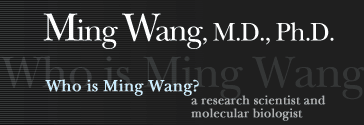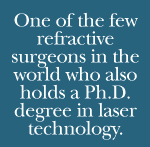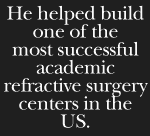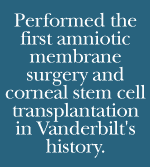  |
 |
Dr. Wang has extensive experience in laser treatments for the entire range of vision disorders: nearsightedness, farsightedness, astigmatism, and presbyopia . His area of expertise includes scientific research and clinical care. In addition to editing textbooks on corneal imaging technology as well as irregular astigmatism, he has published scientific papers in prestigious journals such as Nature (360:606;1992), contributed to several books on refractive surgery and corneal disease, and lectures at major international conferences annually.
He is the chief scientific officer of EyeVU , a joint venture biotech company co-owned by Vanderbilt University and Dr. Wang. He developed the world's first amniotic contact lens for which he received a US patent. As the principle investigator of an NIH grant, Dr. Wang demonstrated success of this technology in reducing corneal scar formation following trauma. It may reduce the incidence of corneal related blindness worldwide. In addition to the amniotic contact lens, he has developed another novel corneal wound healing technology, PEMF treatment, for non-healing corneal ulcers (EyeMag).
In addition to graduating magna cum laude from Harvard Medical School in 1991, Dr. Wang has received numerous awards including the "Lamport Prize for the Best Original Paper in Biomedical Research" from Harvard in 1991, the Lawrence Research Award from the Association of Research for Vision and Ophthalmology in 1995, the Heed Fellowship in 1996, the outstanding young faculty award from Vanderbilt University in 1998, and Fight for Sight Research Foundation grant award in 1998.
Dr. Wang is an internationally recognized teacher in LASIK vision correction. Since 1997, he has taught several major international courses in LASIK and has personally certified LASIK surgeons worldwide. He remains the doctor's choice when physicians choose LASIK for vision correction. He has successfully performed thousands of LASIK procedures and was a "VISX Star Surgeon". He served as a panel consultant on the US FDA Ophthalmic Device Panel which oversees the evaluation and approval for refractive technologies for US, and was a primary reviewer for LASIK at the historical FDA hearing for LASIK in July of 1999.
As the Director of the renowned Wang Vision Institute, Dr. Wang has built a state-of-the-art laser facility for refractive surgery. With the latest technology, Dr. Wang and his team provide a wide range of laser treatments for myopia, astigmatism and hyperopia including photo refractive keratectomy (PRK), laser in-situ keratomileusis (LASIK) and conductive keratoplasty (CK).
As a fellowship-trained corneal specialist, Dr. Wang is frequently consulted for the management of anterior segment complications by doctors from around the world, and patients who have had complications from eye surgery often visit for help. |
|

|


|
Dr. Ming Wang, a research scientist and molecular biologist.
Prior to earning his Ph.D. degree, he attended the University of Science and Technology of China (often referred to as the "MIT of China") from 1978-1982. Dr. Ming Wang received his Ph.D. in laser spectroscopy. In 1987, Dr. Wang was accepted by Harvard Medical School and began a four-year M.D. curriculum in the joint Harvard-MIT M.D. program (Health Science and Technology, or HST).
While at Harvard, he worked with Professor George Church at the Department of Genetics at Harvard and developed a new in vivo technique for assaying DNA-protein binding. The work was published in Nature (Wang MX, and Church GM, Nature, 360, 610, 1992) . Dr. Wang graduated from Harvard in 1991 with medical degree (magna cum laude) and his graduation thesis won the "Lamport Prize for the best thesis reporting original research in biomedical sciences."
Dr. Wang published a paper in Nature in 1992 describing the development of a new molecular biological technique of studying in vivo DNA-protein interaction and gene expression regulation.
In 1993, Dr. Wang began a one-year ocular genetics fellowship and a three-year ophthalmology residency at Wills Eye Hospital in Philadelphia . He worked with Drs. Larry Donoso, Jerry Shields and Francis Munier of Lausanne Switzerland on the genetics of ocular tumors. His work won the first prize as the "Best paper presented by a resident" at the 1994 Annual Wills Eye Hospital Conference. He also received the Lawrence Award from ARVO in 1995.
In 1996, Dr. Wang became a clinical fellow in corneal and external disease and refractive surgery at the Bascom Palmer Eye Institute at the University of Miami . He worked with Drs. Scheffer Tseng, William Culbertson, Richard Forster and Khali Hanna and discovered that transplantation of preserved human amniotic membrane reduces corneal scarring and keratocyte apoptosis in rabbits. The work was published in theJournal of Cataract and Refractive Surgery. In addition, he worked with Dr. Francis Munier in characterizing DNA mutations in keratoepithelin in patients with corneal dystrophies and published papers in the American Journal of Human Genetics and IOVS, among others.
In 1997, Dr. Wang accepted the post as the founding director of Vanderbilt Laser Sight Center at Vanderbilt University School of Medicine in Nashville , TN. While there, he helped build one of the most successful academic refractive surgery centers in US. In 1998 he was asked by the US Food and Drug Administration to serve on the Ophthalmic Device Panel which advises the US government on examination and approval of all ophthalmic technologies.
In 2002, while maintaining his tie with Vanderbilt for research, Dr. Wang moved his clinical practice outside the school and founded a new laser vision center, the Wang Vision Institute , in Nashville, TN. Here, he brought together his years of experience in laser vision correction and corneal wound-healing research. The center is equipped with world-class state-of-the-art technology in laser vision correction and is becoming a bright star on the world stage of laser vision correction.
|
|
Dr. Wang's current research focus brings together his expertise in corneal and external disease, laser technology and molecular biology. Based on his US patent on the novel amniotic contact lens, he ran a laboratory as the principle investigator supported by the NIH grant. In 2001, he cofounded EyeVU, a joint venture biotech company co-owned by Vanderbilt and Dr. Wang. The amniotic contact lens is based on the principle of "tapping the fountain of youth" by taking advantage of the environment of the scarless fetal wound-healing process. EyeVU successfully developed the world's first amniotic contact lens in 2002. Development of this novel technology will reduce the incidence of corneal blindness related to injury.
Molecular biology is another area of research interest to Dr. Wang. Built on his experience of in vivo DNA-protein interaction and gene expression regulation (Nature, 360, 606-610, 1992), he has devoted his efforts to characterizing the gene mutations implicated in corneal dystrophies, a group of hereditary blindness conditions. In 2002, he edited a book on behalf of the American Academy of Ophthalmology entitled Corneal dystrophies and degeneration.
With his Ph.D. and postdoctoral training in laser physics, Dr. Wang continues his innovative research in the further development of refractive laser technologies. His main focus of research in refractive surgery has been in the understanding of the role played by posterior cornea on refractive surgery outcome. His research team discovered in 2002 that posterior corneal contribution was significantly increased, which is the principle limitation of accuracy of today's post-refractive CE IOL power calculation. He is becoming a leader in the field of corneal topography.
In addition to the amniotic contact lens, corneal dystrophy mutations and corneal topography, research interest of Dr. Wang also includes development and improvement of anterior segment recontructive technology to restore vision, such as the amniotic membrane graft and corneal stem cell transplantation.Currently, Dr. Wang is actively investigating a new immunosuppressive drug regimen to improve the success rate of stem cell transplantation.
Dr. Ming Wang, MD, PhD, Director
Wang Vision Institute, Nashville TN 37203
Ph 615.321.8881 | Fax 615.321.8874
Drwang@wangvisioninstitute.com | www.wangvisioninstitute.com |
|


|
|
|


